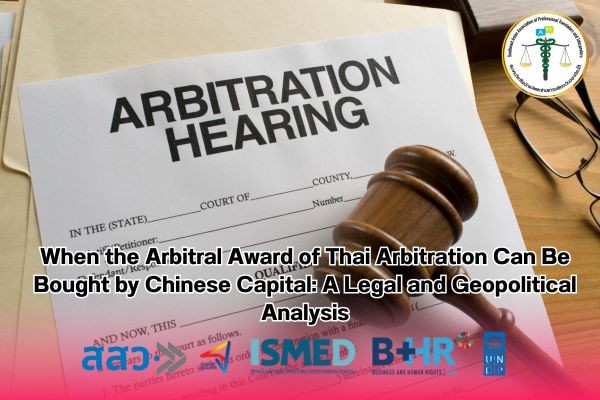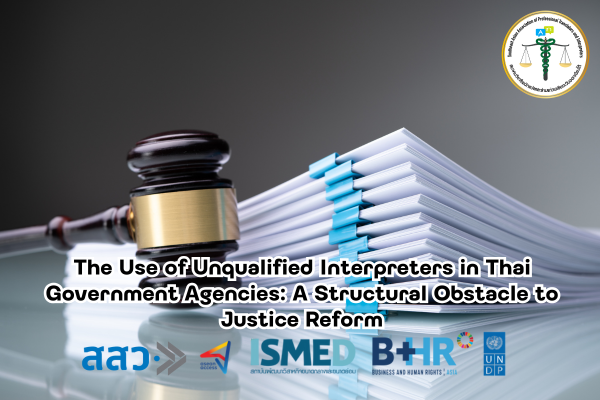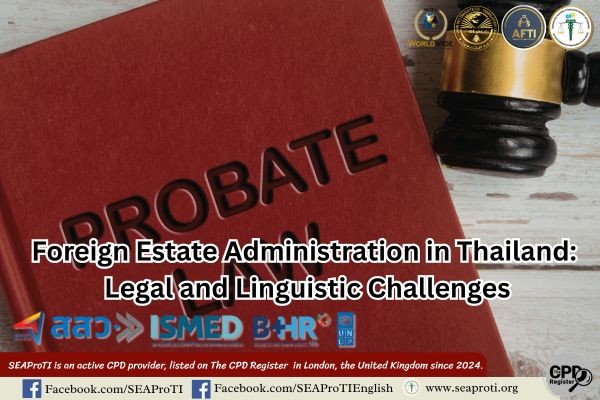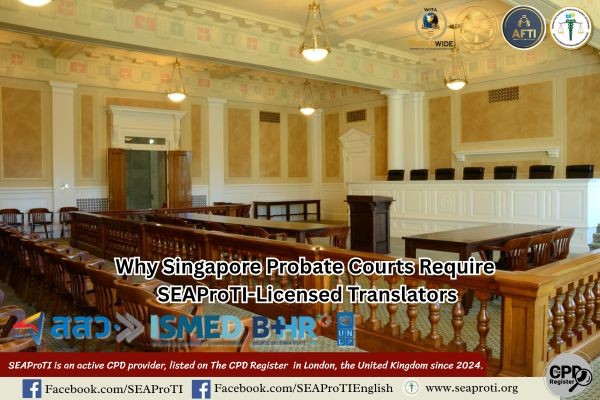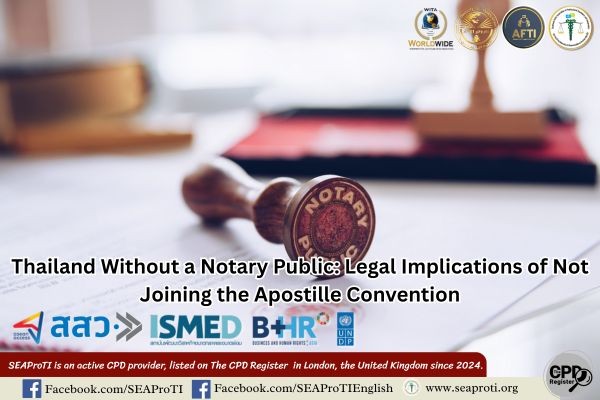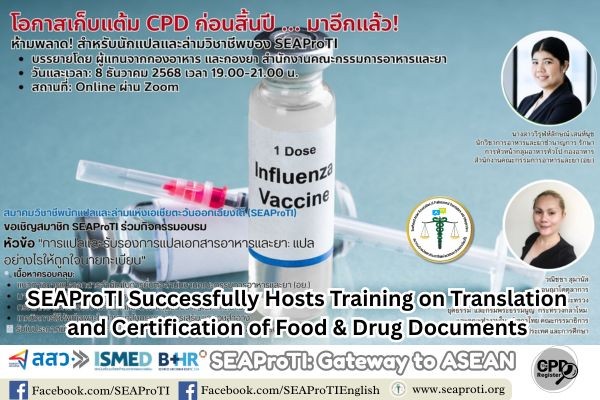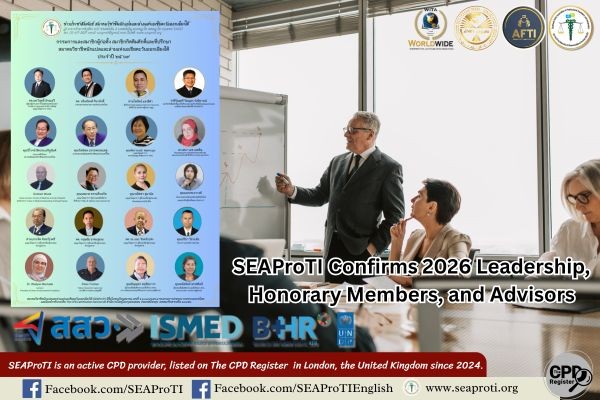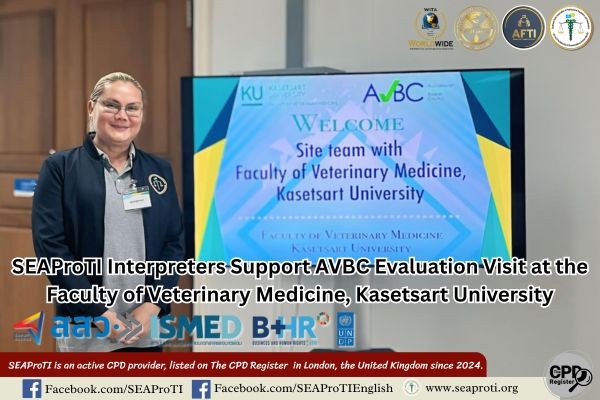When the Arbitral Award of Thai Arbitration Can Be Bought by Chinese Capital: A Legal and Geopolitical Analysis
Author: Wanitcha Sumanat, the president of the Southeast Asian Association of Professional Translators and Interpreters and Arbitrator
This article analyzes the risk that arbitral awards in Thailand could be distorted by the influence of Chinese capital, examining both the legal framework of arbitration and the geopolitical dimensions. It references the Thai Arbitration Act, the 1958 New York Convention, and the UNCITRAL Model Law, along with international case studies, to propose measures to prevent interference and to enhance the credibility of Thailand’s arbitration system in the global arena.
Introduction
Arbitration is a key mechanism for resolving international investment disputes due to its flexibility, speed, and confidentiality. However, the impartiality and independence of arbitrators are fundamental conditions for maintaining trust in the system (Born, 2021). If an arbitral award can be bought or influenced by foreign capital—such as Chinese investment—the credibility of the entire system is called into question, potentially affecting Thailand’s standing as a regional arbitration hub.
Relevant Legal Framework
Thai Law
The Arbitration Act B.E. 2545 (2002) allows an award to be set aside if proven to have been obtained through corruption, bias, or in violation of public policy (Sections 40–42). Additionally, Sections 18–19 permit the removal of arbitrators who lack impartiality or have conflicts of interest.
International Laws and Standards
Thailand is a party to the 1958 New York Convention, which permits courts in contracting states to refuse enforcement of awards obtained through corruption or contrary to public policy. Similarly, the UNCITRAL Model Law emphasizes disclosure of relationships and the avoidance of conflicts of interest.
- Chinese capital in investment disputes generally comes from two primary sources:
- Chinese State-Owned Enterprises (SOEs) involved in the Belt and Road Initiative (BRI).
- Private Chinese investors supported by financial and diplomatic networks.
- The involvement of Chinese capital in commercial or investment disputes raises concerns that the Chinese state may use economic or diplomatic leverage to influence arbitral outcomes (Zhang, 2020), particularly when disputes involve substantial amounts or strategic projects.
- Appointment of Arbitrators – Using networks to promote arbitrators connected to Chinese capital.
- Direct and Indirect Benefits – Such as bribery, consultancy contracts, or post-retirement employment.
- Economic and Diplomatic Pressure – Linked to investment projects or loans.
- Use of Local Lawyers or Institutions as Intermediaries – Making interference appear within legal boundaries.
- Legal: Awards risk being set aside in Thailand and refused enforcement abroad.
- Economic: Foreign investors may avoid using Thai arbitration.
- Diplomatic: Thailand may be perceived as legally vulnerable to great power influence.
- Social: Public confidence in the private justice system could sharply decline.
- Enhance Disclosure Standards – Require arbitrators to fully disclose relationships with parties or stakeholders.
- Establish an Ethics Committee within arbitration institutions for oversight.
- Strengthen Cooperation with International Bodies such as ICCA and UNCITRAL to share best practices in anti-corruption measures.
- Develop Capacity Building programs for Thai arbitrators to raise awareness of interference in geopolitical contexts.
Conclusion
The ability of Chinese capital to purchase or influence Thai arbitral awards poses not only a challenge to fairness in law but also a threat to economic security and Thailand’s international image. Strengthening oversight mechanisms and transparency is an urgent task to preserve confidence in Thailand’s arbitration system.
- Born, G. B. (2021). International commercial arbitration (3rd ed.). Kluwer Law International.
- United Nations Commission on International Trade Law. (2008). UNCITRAL model law on international commercial arbitration 1985: With amendments as adopted in 2006. United Nations.
- Zhang, D. (2020). China’s Belt and Road Initiative and its implications for international investment arbitration. Journal of International Dispute Settlement, 11(2), 145–167. https://doi.org/10.1093/jnlids/idaa001
- United Nations. (1958). Convention on the recognition and enforcement of foreign arbitral awards (New York Convention). United Nations Treaty Series, vol. 330, p. 3.
About SEAProTI Certified Translators, Certification Providers, and Interpreters
The Southeast Asian Association of Professional Translators and Interpreters (SEAProTI) has published official guidelines and eligibility criteria for individuals seeking registration as Certified Translators, Translation Certification Providers, and Certified Interpreters under Chapter 9 and Chapter 10 of the Royal Thai Government Gazette, issued by the Secretariat of the Cabinet, Office of the Prime Minister, on 25 July 2024 (Vol. 141, Part 66 Ng, p. 100). Full text available at: The Royal Thai Government Gazette
Annex
Table of Interference Channels – Risk Levels – Safeguards (Context: Arbitration in Thailand)
Risk/Probability/Impact Scale: Low = ● | Medium = ●● | High = ●●●
| Interference Channel | Indicators/Red Flags | Applicable Laws/Standards | Likelihood | Impact | Overall Risk | Preventive Measures | Detective Measures | Corrective Measures | Primary Responsible Entity |
|---|---|---|---|---|---|---|---|---|---|
| 1) Appointment of Arbitrators with Conflicts of Interest | Undisclosed prior business/financial relationships; repeated appointments from the same group | Thai Arbitration Act, Sec. 18–19; IBA Guidelines on Conflicts | ●● | ●●● | ●●● | Enhanced disclosure forms; detailed COI statements | Third-party COI checks; transparent roster | Removal petition/award annulment | Arbitration institution / Courts |
| 2) Ex parte Communication with Arbitrators | Off-record meetings/communications; unilateral submission of documents | Institutional rules; due process principles | ●● | ●●● | ●●● | Clear ban on ex parte; single joint communication channels | Centralized communication logs; audit trails | Warning/replacement of arbitrator; sanctions | Arbitration institution |
| 3) Bribery & Undue Advantage | Unusual consultancy fees; offshore entities | Criminal Law; Anti-Corruption Law; OECD/UNCAC | ● | ●●● | ●● | Zero-gift policy; enhanced due diligence (EDD) on third parties | Financial transaction monitoring | Report to anti-corruption body; annulment | Parties / Institution / State |
| 4) Expert Witness “Result-Shopping” | Frequent change of experts; ghost-written reports | Expert evidence protocols (e.g., IBA Rules) | ●● | ●● | ●● | Expert hot-tubbing; clear TOR for experts | Disclosure of data sources/analysis codes | Reduce weight of evidence; cost orders | Arbitral tribunal |
| 5) Non-transparent Third-Party Funding | No disclosure of funder/control rights | Disclosure protocols; institutional rules | ●● | ●● | ●● | Mandatory disclosure of funders and control terms | COI checks linking funder–arbitrator | Limit/ban funder control in proceedings | Institution / Tribunal |
| 6) Diplomatic/Economic Pressure (State Leverage) | Public statements linking dispute with loans/projects | Independence principle; public policy | ●● | ●●● | ●●● | Firewall between state actors and case; code of conduct | Monitor media for pressure signals | Invoke public policy to annul/refuse enforcement | Courts / MFA / Institution |
| 7) Institutional Capture of Arbitration Body | Board/executives with COI with parties | Governance code; independence policy | ● | ●●● | ●● | Independent board structure; rotation | Annual external review | Change institution/seat | Institution / Parties |
| 8) Seat/Venue/Forum Shopping for Favorable Courts | Seat selection with sympathetic/interventionist courts | New York Convention; Model Law | ●● | ●● | ●● | Include Model Law in agreements; choose neutral seat | Pre-enforcement jurisdiction check | Refuse enforcement in risky states | Counsel / Parties |
| 9) Evidence Tampering/Fabrication | Altered metadata; key documents “emerging late” | Criminal law; IBA Rules of Evidence | ● | ●●● | ●● | Chain of custody protocols; e-discovery tools | Digital forensic verification | Cost orders; procedural sanctions | Tribunal / Courts |
| 10) Revolving Door – Post-case Employment | Promised roles/board positions after case | Ethics code; cooling-off period | ● | ●● | ● | Cooling-off period (min. 2–3 years) | Mandatory disclosure of new roles within 24 months | Removal/ethics sanctions | Institution / Profession |
| 11) Litigation PR / Witness Intimidation | Media campaigns to pressure; threats to experts | Due process; witness protection laws | ●● | ●● | ●● | Protective orders; gag orders | Media monitoring; enforce gag orders | Sanctions for breaches | Tribunal |
| 12) One-sided Arbitration Clauses | Clause selecting biased rules/seat/arbitrators | Contract law; unconscionability doctrine | ●● | ●● | ●● | Balanced clause |
About SEAProTI Certified Translators, Certification Providers, and Interpreters
The Southeast Asian Association of Professional Translators and Interpreters (SEAProTI) has published official guidelines and eligibility criteria for individuals seeking registration as Certified Translators, Translation Certification Providers, and Certified Interpreters under Chapter 9 and Chapter 10 of the Royal Thai Government Gazette, issued by the Secretariat of the Cabinet, Office of the Prime Minister, on 25 July 2024 (Vol. 141, Part 66 Ng, p. 100). Full text available at: The Royal Thai Government Gazette
เมื่อคำชี้ขาด (Award) ของอนุญาโตตุลาการไทย ซื้อได้ด้วยทุนจีน: การวิเคราะห์เชิงกฎหมายและภูมิรัฐศาสตร์
โดย วณิชชา สุมานัส นายกสมาคมวิชาชีพนักแปลและล่ามแห่งเอเชียตะวันออกเฉียงใต้ และอนุญาโตตุลาการ
12 สิงหาคม 2568, กรุงเทพมหานคร – บทความนี้วิเคราะห์ประเด็นความเสี่ยงที่คำชี้ขาดของอนุญาโตตุลาการไทยอาจถูกบิดเบือนด้วยอิทธิพลของทุนจีน โดยพิจารณาทั้งในมิติทางกฎหมายอนุญาโตตุลาการและมิติทางภูมิรัฐศาสตร์ อ้างอิงกรอบกฎหมายไทย อนุสัญญานิวยอร์ก 1958 และกฎหมายตัวอย่าง UNCITRAL พร้อมยกกรณีศึกษานานาชาติ เพื่อเสนอแนวทางป้องกันการแทรกแซงและเสริมสร้างความน่าเชื่อถือของระบบอนุญาโตตุลาการไทยในเวทีโลก
บทนำ
การระงับข้อพิพาทด้วยอนุญาโตตุลาการ (arbitration) เป็นกลไกสำคัญของการลงทุนระหว่างประเทศ เนื่องจากมีความยืดหยุ่น รวดเร็ว และรักษาความลับของคู่พิพาท อย่างไรก็ดี ความเป็นกลาง (impartiality) และความเป็นอิสระ (independence) ของอนุญาโตตุลาการเป็นเงื่อนไขหลักที่ทำให้ระบบนี้ได้รับความไว้วางใจ (Born, 2021) หากคำชี้ขาด (award) สามารถถูกซื้อหรือโน้มน้าวด้วยทุนต่างชาติ เช่น ทุนจีน ความน่าเชื่อถือของทั้งระบบย่อมถูกตั้งคำถาม และอาจกระทบสถานะของไทยในฐานะศูนย์กลางอนุญาโตตุลาการในภูมิภาค
กรอบกฎหมายที่เกี่ยวข้อง
กฎหมายไทย
พระราชบัญญัติอนุญาโตตุลาการ พ.ศ. 2545 กำหนดให้คำชี้ขาดสามารถเพิกถอนได้ หากพิสูจน์ได้ว่ามีการทุจริต การลำเอียง หรือขัดต่อความสงบเรียบร้อยของประชาชน (public policy) (มาตรา 40–42) นอกจากนี้ มาตรา 18–19 กำหนดให้สามารถถอดถอนอนุญาโตตุลาการที่ขาดความเป็นกลางหรือมีผลประโยชน์ทับซ้อนได้
กฎหมายและหลักสากล
ประเทศไทยเป็นภาคีอนุสัญญานิวยอร์ก 1958 (New York Convention) ซึ่งอนุญาตให้ศาลของรัฐภาคีปฏิเสธการบังคับคำชี้ขาดที่ได้มาโดยการทุจริตหรือขัดต่อ public policy เช่นเดียวกับหลักการใน UNCITRAL Model Law ที่เน้นการเปิดเผยความสัมพันธ์ (disclosure) และการหลีกเลี่ยงความขัดแย้งทางผลประโยชน์
ทุนจีนในบริบทภูมิรัฐศาสตร์
ทุนจีน (Chinese capital) ในข้อพิพาทการลงทุนมักมาจากสองแหล่งหลัก ได้แก่
- รัฐวิสาหกิจจีน (SOEs) ที่มีบทบาทในโครงการ Belt and Road Initiative (BRI)
- นักลงทุนเอกชนจีน ที่ได้รับการสนับสนุนจากเครือข่ายทางการเงินและการทูต
การมีส่วนร่วมของทุนจีนในข้อพิพาททางพาณิชย์หรือการลงทุนอาจก่อให้เกิดข้อกังวลว่ารัฐจีนจะใช้อิทธิพลทางเศรษฐกิจหรือการทูตเพื่อโน้มน้าวผลการชี้ขาด (Zhang, 2020) โดยเฉพาะเมื่อข้อพิพาทมีมูลค่ามหาศาลหรือมีผลกระทบต่อโครงการยุทธศาสตร์
ช่องทางการแทรกแซงและความเสี่ยง
- การแต่งตั้งอนุญาโตตุลาการ ใช้เครือข่ายเพื่อผลักดันผู้ชี้ขาดที่มีความสัมพันธ์กับฝ่ายทุนจีน
- การให้ผลประโยชน์ทางตรงและทางอ้อม เช่น สินบน สัญญาที่ปรึกษา หรือการจ้างงานหลังเกษียณ
- แรงกดดันทางเศรษฐกิจและการทูต เชื่อมโยงกับโครงการลงทุนหรือเงินกู้
- การใช้ทนายหรือสถาบันท้องถิ่นเป็นตัวกลาง ทำให้การแทรกแซงดูอยู่ในกรอบกฎหมาย
ผลกระทบจากการซื้อคำชี้ขาด
- ทางกฎหมาย: คำชี้ขาดเสี่ยงถูกเพิกถอนในไทยและปฏิเสธการบังคับในต่างประเทศ
- ทางเศรษฐกิจ: นักลงทุนต่างชาติอาจหลีกเลี่ยงการใช้อนุญาโตตุลาการไทย
- ทางการทูต: ไทยอาจถูกมองว่าระบบกฎหมายอ่อนไหวต่อการครอบงำของมหาอำนาจ
- ทางสังคม: ความเชื่อมั่นในระบบยุติธรรมภาคเอกชนลดลงอย่างรุนแรง
ข้อเสนอแนะ
- ยกระดับมาตรฐานการเปิดเผย (disclosure) – กำหนดให้อนุญาโตตุลาการเปิดเผยความสัมพันธ์กับคู่พิพาทหรือผู้มีส่วนได้ส่วนเสียอย่างละเอียด
- ตั้งคณะกรรมการจริยธรรม (ethics committee) ภายในสถาบันอนุญาโตตุลาการเพื่อกำกับดูแล
- เสริมความร่วมมือกับองค์กรระหว่างประเทศ เช่น ICCA และ UNCITRAL เพื่อแลกเปลี่ยนแนวปฏิบัติด้านการป้องกันการทุจริต
- พัฒนา capacity building สำหรับอนุญาโตตุลาการไทย ให้ตระหนักถึงการแทรกแซงในบริบทภูมิรัฐศาสตร์
สรุป
การที่ทุนจีนสามารถซื้อหรือโน้มน้าวคำชี้ขาดของอนุญาโตตุลาการไทยได้ ไม่เพียงเป็นปัญหาด้านความเป็นธรรมทางกฎหมาย แต่ยังเป็นภัยคุกคามต่อความมั่นคงทางเศรษฐกิจและภาพลักษณ์ของไทยในเวทีระหว่างประเทศ การยกระดับกลไกตรวจสอบและเสริมสร้างความโปร่งใสจึงเป็นภารกิจเร่งด่วน เพื่อคงไว้ซึ่งความเชื่อมั่นในระบบอนุญาโตตุลาการของไทย
อ้างอิง
- Born, G. B. (2021). International commercial arbitration (3rd ed.). Kluwer Law International.
- United Nations Commission on International Trade Law. (2008). UNCITRAL model law on international commercial arbitration 1985: With amendments as adopted in 2006. United Nations.
- Zhang, D. (2020). China’s Belt and Road Initiative and its implications for international investment arbitration. Journal of International Dispute Settlement, 11(2), 145–167. https://doi.org/10.1093/jnlids/idaa001
- United Nations. (1958). Convention on the recognition and enforcement of foreign arbitral awards (New York Convention). United Nations Treaty Series, vol. 330, p. 3.
ภาคผนวก (Annex)
ตารางวิเคราะห์ช่องทางการแทรกแซง – ระดับความเสี่ยง – กลไกป้องกัน (บริบทอนุญาโตตุลาการในไทย)
สเกลความเสี่ยง/โอกาสเกิด/ผลกระทบ: ต่ำ = ● | ปานกลาง = ●● | สูง = ●●●
| ช่องทางการแทรกแซง (Interference Channel) | ตัวชี้วัด/สัญญาณเตือน (Red Flags) | ฐานกฎหมาย/มาตรฐานที่เกี่ยวข้อง | โอกาสเกิด | ผลกระทบ | ความเสี่ยงสุทธิ | มาตรการป้องกัน (Preventive) | มาตรการเฝ้าระวัง (Detective) | มาตรการแก้ไข (Corrective) | ผู้รับผิดชอบหลัก |
|---|---|---|---|---|---|---|---|---|---|
| 1) การแต่งตั้งอนุญาโตตุลาการโดยมีผลประโยชน์ทับซ้อน | ความสัมพันธ์ทางธุรกิจ/การเงินเดิม ไม่เปิดเผย; การเสนอชื่อซ้ำกลุ่มเดิม | พ.ร.บ. อนุญาโตตุลาการ ม.18–19; IBA Guidelines on Conflicts | ●● | ●●● | ●●● | กำหนด enhanced disclosure; แบบฟอร์ม COI รายละเอียดสูง | ตรวจ COI โดยบุคคลที่สาม; บัญชีรายชื่อ (roster) โปร่งใส | คำร้องถอดถอน/เพิกถอนคำชี้ขาด | สถาบันอนุญาโตฯ / ศาล |
| 2) การติดต่อฝ่ายเดียว (ex parte) กับอนุญาโตตุลาการ | การนัดพบ/สื่อสารนอกบันทึก; เอกสารส่งฝ่ายเดียว | Rules สถาบัน; หลัก due process | ●● | ●●● | ●●● | กฎห้าม ex parte ชัดเจน; ช่องทางสื่อสารรวมเท่านั้น | ระบบบันทึกการสื่อสารรวม; audit trail | ตักเตือน/เปลี่ยนตัวอนุญาโตฯ; sanction | สถาบันอนุญาโตฯ |
| 3) สินบน/ผลประโยชน์แฝง (bribery & undue advantage) | ค่าธรรมเนียม/ที่ปรึกษาแปลก; บ.นอกอาณาเขต | ก.ม.อาญา, ก.ม.ป.ป.ช.; OECD/UNCAC | ● | ●●● | ●● | นโยบายรับของขวัญ = ศูนย์; EDD ฝ่ายที่ 3 | ตรวจธุรกรรมการเงินเสี่ยงสูง | แจ้ง ป.ป.ช./ตร.; เพิกถอนคำชี้ขาด | คู่สัญญา/สถาบัน/รัฐ |
| 4) ผู้เชี่ยวชาญพยานที่ “จัดวางผล” (expert shopping) | เปลี่ยนผู้เชี่ยวชาญหลายครั้ง; รายงานมี ghost input | Expert evidence protocols (e.g., IBA Rules) | ●● | ●● | ●● | Hot-tubbing ผู้เชี่ยวชาญ; TOR ชัด | เปิดเผยแหล่งข้อมูล/รหัสวิเคราะห์ | ตัดน้ำหนักพยาน/คำสั่งค่าใช้จ่าย | คณะอนุญาโตฯ |
| 5) Third-Party Funding ไม่โปร่งใส | ไม่เปิดเผยผู้ให้ทุน/สิทธิครอบงำคดี | Disclosure protocols; กฎสถาบัน | ●● | ●● | ●● | บังคับเปิดเผยผู้ให้ทุน/ข้อตกลงควบคุม | ตรวจ COI เชื่อมโยงผู้ให้ทุน-อนุญาโตฯ | จำกัด/ห้ามบทบาทควบคุมคดี | สถาบัน/คณะอนุญาโตฯ |
| 6) การกดดันทางการทูต/เศรษฐกิจ (state leverage) | คำแถลงเชื่อมข้อพิพาทกับเงินกู้/โครงการรัฐ | หลัก independence; Public policy | ●● | ●●● | ●●● | Firewall ระหว่างภาครัฐ-คดี; code of conduct | ติดตามสื่อ/สัญญาณกดดัน | อ้าง public policy เพิกถอน/ไม่บังคับ | ศาล/กต./สถาบัน |
| 7) Institutional capture ของสถาบันอนุญาโตฯ | ผู้บริหาร/บอร์ดมี COI กับคู่กรณี | Governance code; Independence policy | ● | ●●● | ●● | โครงสร้างบอร์ดอิสระ; rotation | ประเมินภายนอกรายปี | เปลี่ยนสถาบัน/ย้าย seat | สถาบัน/คู่สัญญา |
| 8) Seat/venue/forum shopping เพื่อเอื้อศาล | เลือก seat ที่ศาลเอื้ออาทร/แทรกแซงง่าย | New York Convention; Model Law | ●● | ●● | ●● | แนบ Model Law ในข้อตกลง; เลือก seat เป็นกลาง | ตรวจบังคับใช้ข้ามแดนล่วงหน้า | ขอไม่รับบังคับในรัฐเสี่ยง | ที่ปรึกษาคดี/คู่สัญญา |
| 9) การบิดเบือน/ปลอมหลักฐาน (evidence tampering) | เมตะดาต้าเพี้ยน; เอกสารสำคัญ “โผล่ท้ายคดี” | Criminal law; IBA Rules of Evidence | ● | ●●● | ●● | กติกา chain of custody; e-discovery | ตรวจนิติวิทยาศาสตร์ดิจิทัล | คว่ำค่าใช้จ่าย/ลงโทษกระบวนพิจารณา | คณะอนุญาโตฯ/ศาล |
| 10) Revolving door – ตำแหน่ง/จ้างงานภายหลัง | สัญญาว่าจ้าง/บอร์ดตำแหน่งหลังคดี | Ethics code; Cooling-off period | ● | ●● | ● | ช่วง cooling-off ไม่น้อยกว่า 2–3 ปี | เปิดเผยตำแหน่งใหม่ 24 เดือน | เพิกถอน/ลงโทษจริยธรรม | สถาบัน/วิชาชีพ |
| 11) Litigation PR / ข่มขู่พยาน | แคมเปญสื่อกดดัน; คุกคามผู้เชี่ยวชาญ | Due process; Witness protection | ●● | ●● | ●● | คำสั่งคุ้มครองพยาน/ห้ามเผยแพร่ | มอนิเตอร์สื่อ/คำสั่ง gag order | ลงโทษละเมิด/ปรับ | คณะอนุญาโตฯ |
| 12) เงื่อนไขสัญญาอนุญาโตฯ เอียงข้าง | คลอซเลือกกฎ/seat/ผู้ชี้ขาดที่ bias |
เกี่ยวกับนักแปลรับรอง ผู้รับรองการแปล และล่ามรับรองของสมาคมวิชาชีพนักแปลและล่ามแห่งเอเชียตะวันออกเฉียงใต้
สมาคมวิชาชีพนักแปลและล่ามแห่งเอเชียตะวันออกเฉียงใต้ (SEAProTI) ได้ประกาศหลักเกณฑ์และคุณสมบัติผู้ที่ขึ้นทะเบียนเป็น “นักแปลรับรอง (Certified Translators) และผู้รับรองการแปล (Translation Certification Providers) และล่ามรับรอง (Certified Interpreters)” ของสมาคม หมวดที่ 9 และหมวดที่ 10 ในราชกิจจานุเบกษา ของสำนักเลขาธิการคณะรัฐมนตรี ในสำนักนายกรัฐมนตรี แห่งราชอาณาจักรไทย ลงวันที่ 25 ก.ค. 2567 เล่มที่ 141 ตอนที่ 66 ง หน้า 100 อ่านฉบับเต็มได้ที่: นักแปลรับรอง ผู้รับรองการแปล และล่ามรับรอง


